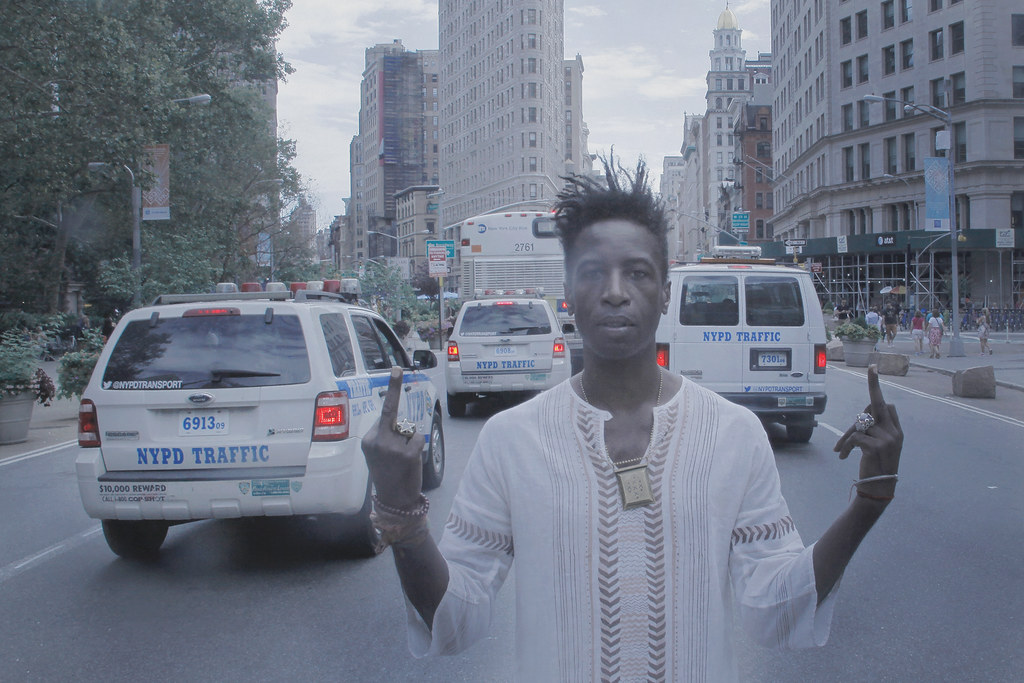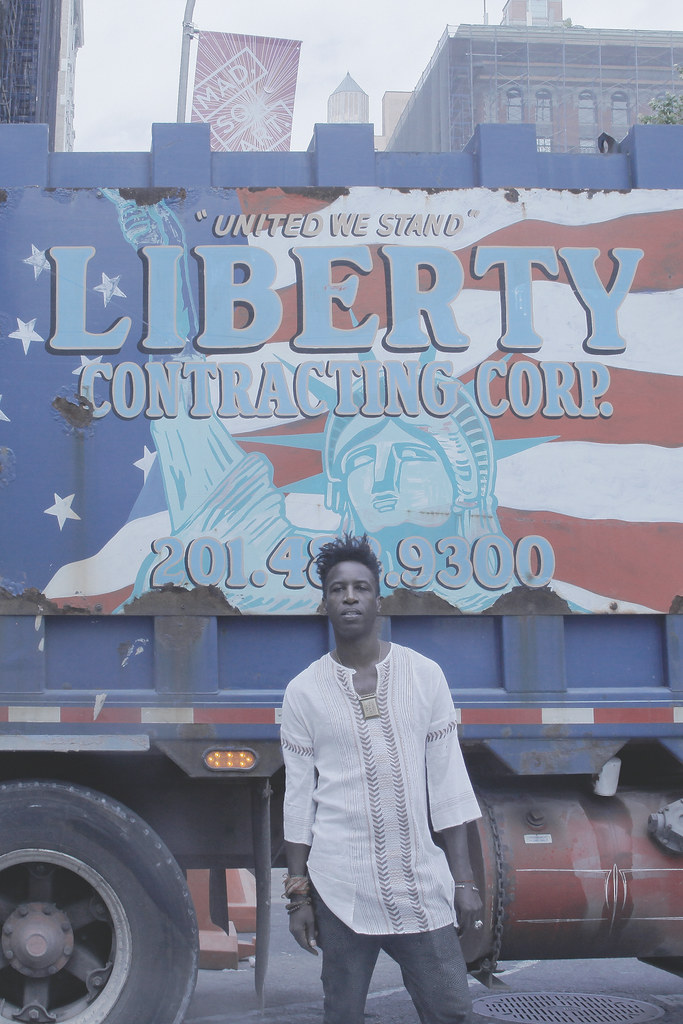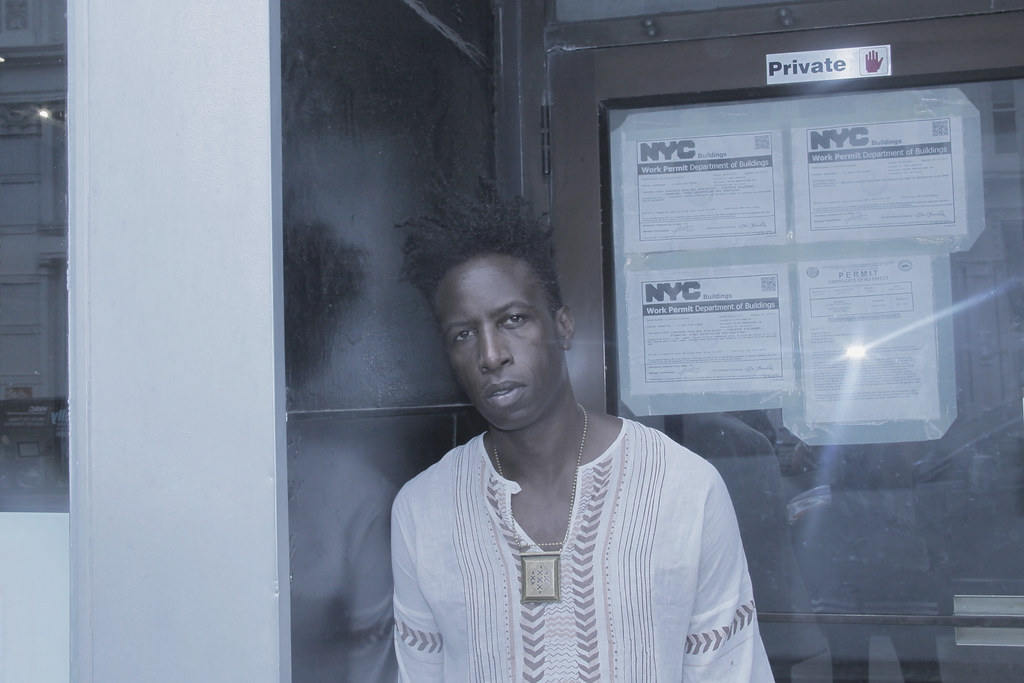photos / Natalie Kucken
story / Magnus Wiberg
I got the opportunity to sit down with Saul Williams, the legendary artist and laureate of our generation. Through our conversation, he took me on a narrative tour of the history and future of New York. It was a breath of fresh air into my Scandinavian soul.
Our conversation was an open-hearted interview about New York, Black Lives Matter, NYPD, and the gentrification struggles of a New York artist, a historian if you will. A Saul William’s manifesto to life, liberty, and the pursuit of everything in between.
Check out his latest album, “MartyLoserKing.”
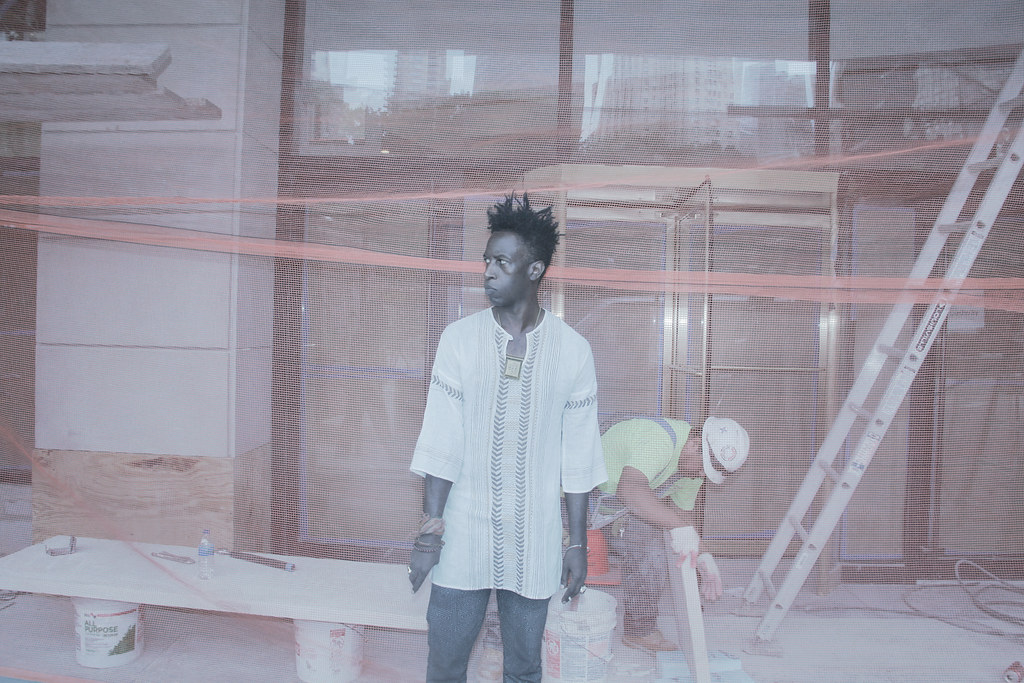
“You want something scary?” Saul Williams says while he stares deep into my eyes with his dark brown, piercing stare. We are sitting at Jivamukti Yoga on Broadway, chatting over coffee. Our conversation has ranged from the NYPD to the history of Manhattan. We are amusing ourselves with NYC horror stories.
“I’ve always felt pretty safe in New York,” Saul says, then getting serious, “Simultaneously, you learn how to play it safe in New York, so you know where to go, where not to go. The strangest moment I had was outside of Port Authority when I was fourteen. I grew up in Newburgh, NY, which is an hour outside of New York City. As a kid, I would take the train—the Metro North—by myself and come into the city, every Saturday for example, to go to HB Studios and the West Village to study acting. I started doing that on my own when I was twelve
Both of my parents are from Brooklyn, and I was raised there as well. My dad, for him, it was super important that I know the city as a kid. He was very much about, “I’m not dropping you off, you have to get on the train, find your way there and be back tonight.” So, I’d wander, wander, wander. This thing didn’t happen on a Saturday. I had a godfather living in the city. I was gonna go spend part of my Christmas break with him, because he was gonna take me shopping on Orchard Street or something. It’s where we used to get all the hip-hop jewelry, name plates and name rings. Orchard was the spot for hip-hop gear back in the day.
I’m going to spend a week with my godfather, and I’m taking the bus this time to the Port Authority. I’m fourteen, I’m starting to get into clothes more and into fashion, trying to be cool, all of that. My dad happened to have a leather trench coat in the closet that he never wore, which I found and was like, “Dad can I wear this?” And he was like, “I don’t care, wear that, sure.”
So, fourteen, hanging out at Port Authority. Now, this is the time: Port Authority and 42nd Street. This is the pre-disinfection of 42nd Street. Pre-Giuliani, Pre-Bloomberg. When I was growing up, 42nd Street was a movie theater. Those movie theaters would show films that were already out, that we knew about, but there were also porn movies and a lot of kung-fu movies. For a kid, it was terrific. There were prostitutes in the street—I mean like, crazy. Bruce Lee movies and Drunken Dragon [the 1985 movie] and all… and like, peep shows. You could literally [see] peep shows and the latest regular movies—it was just packed with that. It was eye-opening. Woah, what is this place? The Port Authority had, for whatever reason, a large transgender population that was living and moving through the Area. Any time I’d get off the bus there, you would see gangs—and by gangs I mean like forty or fifty groups of ten here, groups of ten over there—of transsexuals, people between sexes, people between worlds.
Once again, I’m looking through my fourteen-year-old eyes—that’s what Port Authority was. It was eye candy; it was amazing to walk into a world full of everything you would imagine at a Harry Potter crossroads. It was like—holy shit. New York is not what it used to be. New York now, you walk in and you don’t feel that anything happened, a transient vibe. You feel way more sophisticated and mono-cultural, like a student, executive, or hipster. You feel that, for the most part. And all these places have been cleaned up.
So this day, it’s ten a.m. on a Sunday morning. I’m in my dad’s trench coat. My dad was a minister, and my godfather played piano in a church in New York; he was a pianist. So I had on a suit as well, because I knew he was gonna pick me up and go to church, and then we’d go hang out.
So I’m fourteen years old, clean-cut, in a suit, with a leather trench coat, standing on the corner outside 23rd. I see this man… [laughs] He walks up. I see him looking at me, kinda walks away, and keeps looking. I’m like, ‘Who is this guy?’ He walks in another direction, continuing to look. Finally, he walks up to me and he’s like, “What’s a beautiful boy like you doing lost in this big city? You need any help?”
And I’m like—you know, I’ve seen the movies. I’ve read a few books—“Uh, n-no, thank you, I’m fine.” He’s like, “You don’t seem fine. You’re all alone here, all dressed up.” He was full of clichés—all, all dressed up and nowhere to go. “I’m just waiting for my godfather.” He’s like, “Godfather? I could be your godfather.”
Oh my god.
“Why don’t you come with me?” And I’m like scared as hell, looking for a policeman and all that, and my godfather pulls up.
So scary. Imagine what could have happened.
Yeah, imagine what could’ve happened. I mean, that’s a safe yet scary experience.
Yeah.
As far as New York… It’s never been too intense. I’ve been in environments where things have gone down and it hasn’t been cool, but for me in New York City? It’s been all right. But that’s something that I would clearly…
Well, imagine how many young kids got preyed on back in the day. I think New York has always been a center, a hub for people to come if they have nowhere to go.
Well yeah, it’s always full of runaways. I’d always see kids my age, homeless, with signs. You’d always try to figure out whether they were really homeless or whether they were scheming or whatever. You never really knew. But I would always be amazed in Port Authority at the sorts of people I saw, especially when they felt close in age to me.
I can relate to that experience. I remember the first time I came to New York and I came out at 42nd street and see all these flashing lights and go, “Wow, what is this?” It felt like the end of the world, like the end of Western civilization we’re seeing here. However, I was also drawn into it, or attracted to it in some way. At the same time, you’re scared and, what is this? What’s going on? This is just too much. Information overload. But at the same time you wanna be a part of it. That’s what got me drawn in. That’s where I started to love the city. It’s scary, but it draws you in. You’re sort of excited by it in some sense. It’s a good story.
How would you describe New York, if you could describe it in one sentence? Or one motto?
I would say it’s a vortex of energies colliding. The Manhattan Indians were the original people on this island. They did not live on the island because they believed the energy was too strong. They lived around it and they would come to the island of Manhattan to perform rites of passage and ceremonies and to hunt. But they would never actually sleep on the island. And they would only stay in the region of New York City before they would go upstate for seven years, for no more than seven years, because they felt that the energy was too strong. So that when you consider Wall Street, you know, not just what that means for New York, but what that means to the global capitalist empire, consider that. And then you consider all this, being the birthplace or the crossroads of so many different art forms and all these things.
There are so many ideas and realities that cross paths. There’s a fight in New York, that’s crazy. It manifests occasionally, like the Occupy Movement, for example. This is the headquarters of the one percent. This is the headquarters of that. But it’s not a prosperous city.
If you look at the history of the city, if you look up Robert Moses, the guy who designed so much of the city as we know it. Robert Moses built the West Side Highway, the FDR, the Triborough Bridge, and the George Washington Bridge—everything that we know about the circulation of the city was built by this guy, Robert Moses. There’s a book about him, called The Power Broker. And honestly, you learn so much about New York and how it works from that, because the other side of that is that it’s a city of workers, blue-collar workers. And a city of immigrants, like why do we call cops “cops,” for example. Because, in New York and Massachusetts, when they came, they were Irish, and many of them had red hair. And so they called out, “Here come the coppers!” The red hair. The cops were Irish. There were various factors and realities that affected different immigrant populations. My parents, my grandparents, my great-grandparents arrived at Ellis Island in 1917 from Haiti to New York. There are so many stories of people who arrived in this country through New York. It’s an intense vortex of all these different energies, often conflicting energies.
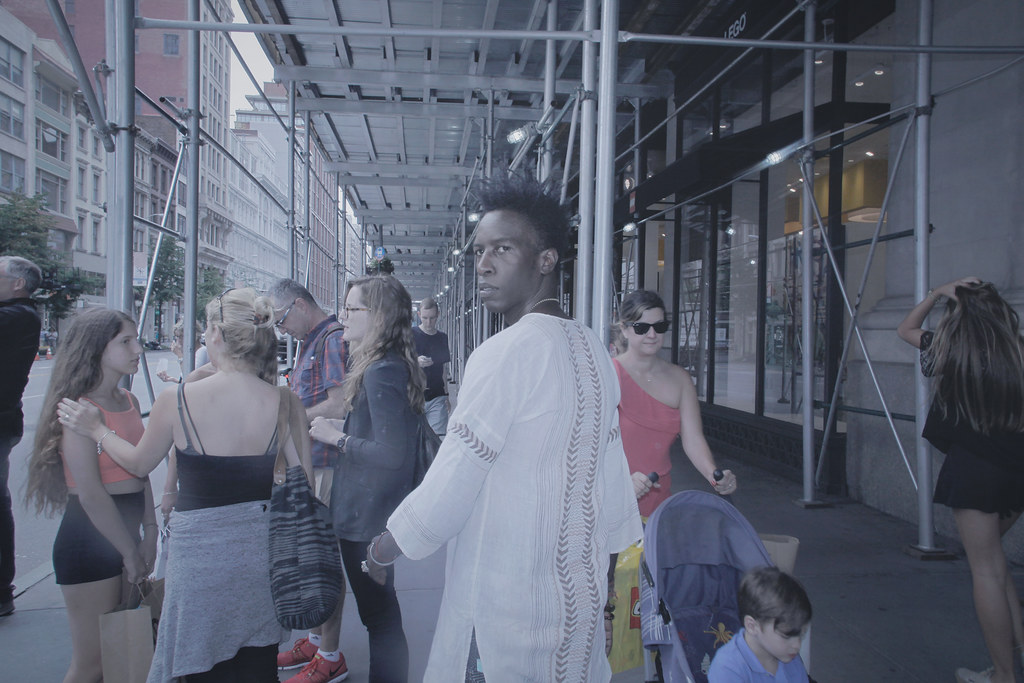
Do you still feel that way about New York? Do you feel that the power, the energy, is more subdued now? Or do you think that it was stronger back then?
I don’t think energy is any more or less. I think the fight is harder. But I think that things come in cycles in terms of who’s winning and what’s winning. In terms of artists, for example. People used to come to New York, like this is where you can make it. But it’s also because this is where you could find cheap rent, or a loft at a particular price, because artists need space. New York is not a place that’s very open to artists right now. When I moved back to New York two years ago, I got turned down from three apartments. I had to look at over thirty before I found my spot in Harlem. It was because the landlords chose not to have artists. They prefer to have students whose parents can cosign, because they can pay more. They’re not interested in families. They’re not interested in artists. They want more stable salaried and blah, blah, blah.
New York is dead in those regards. In terms of, when you think of New York and what it meant for, let’s say, jazz. Let’s say what it meant for punk rock. Let’s say what it meant for hip-hop. Let’s say what it meant for independent films. We think of Patti Smith. We think of the Ramones. We think of Run DMC, and fuckin’ everything, [laughs] Wu-Tang Clan. Half of those things couldn’t exist in the New York that is now. They wouldn’t be born in the same way, you know? New York is really a microcosm of this country. That’s the thing about New York. New Yorkers—you always feel like there’s New York and then there’s the rest of the country.
There’s a certain progressive attitude that normally exists here. And it’s true to an extent. The rest of the country is very well reflected in New York. The stuff we go through with the NYPD, for example, which still and look and act a particular way. There’s nothing progressive about the NYPD. Nothing. There’s really progressive about a lot of the ways the city has transformed. But it’s true. It’s transformed. But when you compare that to a city like Seattle, right? A city where they say… Look at Rikers Island and all the types of prisoners we have there—the number of people in prison right now who are awaiting trials, who are there simply because they can’t afford to pay bail.
It’s sad because they wanna get rid of—it’s almost like they’re trying to eradicate a whole group of people who are… they don’t wanna see homelessness. They don’t wanna see black people. They don’t wanna see anything that reminds them of poverty or struggle.
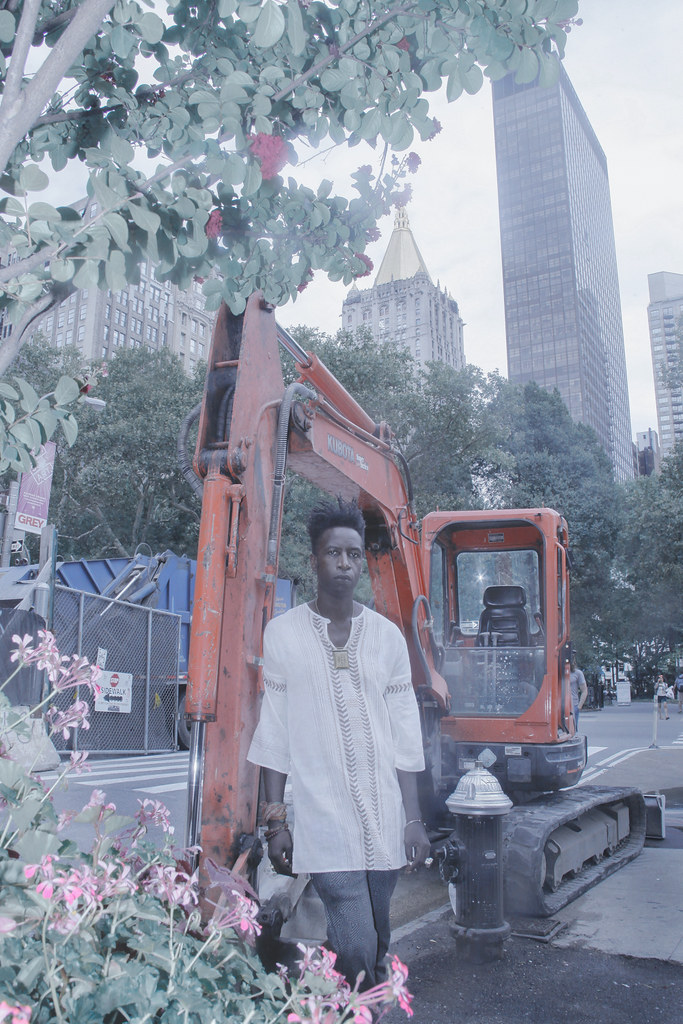
It’s the same thing that you feel in Beverly Hills. When you homogenize a place in that way, when you whitewash it that way, you make that place so boring. You take away the coolest shit. Like, why is there so much great stuff coming out of, what is it, Gothenburg?
Yeah, Gothenburg.
Why is there so much cool shit coming out of that city?
I think more artists are living there, because Stockholm, in a way, is the New York of Sweden.
Right.
They get priced out of Stockholm, and it’s hard to get an apartment in Stockholm.
Exactly, that’s why I brought it up. It’s a rhetorical question, but that’s why, to most people across the world right now, that place is more interesting than Stockholm. All of these different factors combine to create an environment that enables people to create something. New York has taken away the dopest shit, so that it would not allow, you know?
It feels like things are so much more closed off now. Everyone’s so… this whole hipster culture.
It’s vacant.
It’s very vacant. It doesn’t feel like anything is real or transparent. Everything’s about—who do they know? How much money do they have?
And that’s completely vacant.
So what’s the solution? And is there a hope for New York?
Things go in cycles. These motherfuckers can’t win. The banks will not win. They might kill an entire generation, and they brainwash the generation as a whole, but at the end of the day, humanity is gonna win. Democracy is gonna win. Even the things that they create—the internet. There’s all of these things that they didn’t realize they gave us. If they knew, if they knew how much power social media could put into our hands, it would have never existed.
It would never have existed.
We’re always gonna be a step ahead. We’re always gonna have poetry, art, and music to inspire to paint, to fucking, graffiti, you know. We’re always gonna have the power to bring shit down. And [we’re] always gonna have the streets to come and stand up and say, “Whose streets? Our streets.” [laughs] You know what I’m saying? We’re always gonna have that. It’s just cycles. It’s just cycles. The harder they push; the harder they fall.
Yeah.
That’s all that is. I mean, look at right now. We went through this whole Reaganomics shit since the eighties and all this stuff building through the nineties—more and more corporate, capitalist, big business, whatever. And America’s becoming Socialist? I mean, essentially, we’ve all basically realized we should have healthcare. We’ve all basically realized, like Obama’s talking about, why can’t American students get at least two years of college for free? We’re never gonna call it Socialism, because we’re not in Europe and we have this perverse relation from the Cold War that we can’t use the terms. But at the end of the day, that’s what’s gonna win. That’s what’s gonna win.
Yeah, hopefully.
Oh yeah. We just have to fight through the Trumps and Kasichs, you know? And these big names with money that have always existed and watch them fuckin’ crumble. That’s all that happens. It’s amazing, the sort of bullshit you have to tolerate in the name of democracy—the most ignorant voices that get airplay. [laughs]
Yeah, and push their way, or buy their way to the top.
Yeah, and all this shit. However, at the end of the day, people are becoming more intelligent.
I agree. That’s why Occupy Wall Street was refreshing, as it pushed back against the culture of banks.
Yeah. And when it comes back, when the Black Lives Matter movement, the Occupy movement, the Anonymous movement, when all of these things, all of these different movements, all of these different hashtag movements realize the intersectionality and connections between what we’re fighting and what we’re asking and what we’re demanding—watch out. Our struggle has always been the same. It’s always been the fucking same. But we’ve been forced… You know, it’s like, poor white people going, “You want this and fuck them niggers.” And it’s like, actually, the government pushed the idea of keep them separate and pushed the idea of racism on them.
When white people in America in the South were asking for money, fighting the one perfect, they formed militias. George Washington wasn’t just the first President; he was the most prominent landholder and the wealthiest man on the continent before he became President. It’s always been that fight.
After the Civil War, which was about the economy and what the Southern economy was based on, which was slavery, versus the Northern economy which was business-making and all this shit—there was a connection between the two. They formed militias in the South to come and attack the bankers, just like Occupy. The government panicked. And the reason in the South why they were so upset, was because they were looking at these now freed slaves that were fucking poor like them and they had to live next to these fucking bastards? Right? And the government panicked and didn’t want these white guys in the South to form militias and try to start protesting the government.
What did they give them? They give them separate, but equal. They gave them the white-only, back of the bus. They didn’t give them money. They gave them a stronger sense of entitlement, they fed their egos, you know what I’m sayin’?
Like you’re better than these people, and they didn’t want them to form together, either.
Exactly, that was their biggest fear. Because if they had gotten together and said, “What the fuck? Where’s my forty acres? What’s up with this?” That would have been a problem. All we have to do is connect every movement, and it’s over for these guys. That’s the whole thing.
Because we’re all fighting for the same things. Occupy, Black Lives Matter—really, we are fighting for the same thing. We just want… basic dignity.
Basic dignity. The thing is, without education, what’s behind every act of racism? Ignorance. It’s ignorance. So, when you see that manifested systematically in our police system, you realize that the amount of police training a police officer must have in order to become a police officer is not enough. We need more training that’s gonna help them deal with shit inside themselves before you give them a badge and a gun. So that they don’t perpetuate the fucking shit that they’re going through in their lives on the first person they see.
I read this crazy thing today, because there’s this whole big fight about workplaces, maybe not like this, but in fast food places and all that, people wanting to be paid fifteen dollars an hour—a living wage. You know who earns less than a living wage? The lowest-paid people? The people who work in the food and dining industry on Capitol Hill. The people who feed the senators, who work in the Senate dining room, who work in the Senate cafeteria, the Congress cafeteria—those are the least paid.
There’s a huge article today about how many jobs some of those people have and how in 2008, we outsourced those jobs to a British company, which pays them less than a living wage. So the fight to get senators to vote for a living wage starts from the shit that’s feeding them every day.
How can we expect our government to come to its senses, if at the root of our government, they’re the ones perpetuating this shit? Then you understand the #BurnItDown hashtag.
It is frustrating to see.
Yeah, you see it happening around you.

You feel helpless.
To the corruption and the bullshit.
Like you can’t do anything, and that’s why people are joining together.
That’s all we have to do, that’s all we have to do. At some point, it starts to work against them. It starts to work against the system of powers. At some point people are gonna demand. When squatting culture comes back—there’s too many fucking abandoned buildings in New York. My wife and I are looking at eachother like, “What are the squatting laws in this city again?” You know?
Remember those late eighties and nineties? You couldn’t kick the squatters out.
Many people own those buildings now. You see it big time in Europe. It’s happening here, too. It’s just a matter of enough people being fed up.
When you first started off with spoken word, where in New York did you feel like you had the biggest community?
Without a doubt, for me, it was…Brooklyn, at a place called the Brooklyn Moon Café. The Brooklyn Moon Café was a small venue with an open mic; it wasn’t a competition. You just signed up for the open mic. That was where I felt free enough to try some ideas and do things. I realized that I was onto something before I brought it to Manhattan. It was in the Brooklyn Moon Café that I met Yassin Bey, who’s Mos Def now, or Talib Kweli, or Erykah Badu… all these people I met, I met in the Brooklyn Moon Café. I met the Last Poets there. That’s what got me the invitations to meet Allen Ginsburg, Gil Scott-Heron, or Mary J Blige—it all started in the Brooklyn Moon Café. There was a community there of young artists, not all poets. I met so many painters, so many novelists, I met other actors and directors and photographers—all this stuff, you know? Maybe there was the last bastion of the thing you were looking for in New York.
That sounds beautiful.
Yeah. I caught the tail end of that. I left New York in 1999 and returned in 2013. When I left, I already felt like, “It’s over.”
So you can’t go anywhere these days to experience the same thing?
Oh yeah, you can. Certainly you can. Those things happen all over the place. When I left here, I went to L.A., and I found the same thing being born in L.A. I arrived in L.A. and ended up connecting with other new artists who weren’t out yet, who now everybody knows. It was the same thing, all Flying Lotus, Cody Chesnutt, and all this shit that was circulating there and we were hanging out. I felt that I got to L.A. at the perfect time to be a part of the thing again over there. It’s always been this shit of like, “Holy fuck, okay.” I saw it happen in Seattle, Portland, and Austin. I saw it happen in so many different places—Detroit. It’s always happening and it’s happening globally.
What clubs in New York do you like performing at the most and why?
When I lived in New York before, I did perform as a local. Every night I was performing somewhere—I was at NYU and then I’d leave at eleven and get out of play rehearsal and then I’d always go, “Oh, we’re going to this spot tonight, or we’re going here, we’re going here…” Now, I’m pretty low-key. The main place that I hang out, when I go out, is a club my friend owns, it’s called New Group. It’s down on the Lower East Side, he’s a musician from Turkey. It attracts a lot of bona fide musicians, and so a lot of us hang out at his spot just because it’s a cool vibe and always features good music. I DJ there sometimes unannounced. I hang out there sometimes. I keep it low now. Now when I perform in New York, most people are like, “Oh, you’re in town for a show?” And I’m like, “No, actually, I live here.” But you won’t see me until it’s tour time. I don’t know what venue I prefer, I still haven’t performed in all of them. There are several that I’m looking forward to—Lincoln Center. But you know, Radio City Music Hall or Carnegie Hall. I’d love to do a poetry reading in some orchestral place—at the MET.
Do you feel like there’s been… that certain people from various movements calling you to action? You seem like you’re the poet laureate of the scene.
Yeah, I’ve been asked. I’ve done fundraisers for protesters in Ferguson and stuff like that. But also, I feel like the movement is an opportunity for artists like me to catch our breath. Because, I tell you—I was here fifteen years ago saying the same fucking shit. And I heard a bunch of rappers say, “Throw your hands in the air.” So it was like feeling alone in that shit. Right now, at least, it’s cool to see other people engaged and hear other voices. Like, “Phew!” I don’t have to feel like the only one saying stuff. Now, I’m mentoring a lot of these activists and artists who are a part of it, saying, “Don’t forget to take care of yourself.” Because this is a long fight.
This is a lifelong battle. So, sustain yourself. Someone else is gonna get killed by the police tomorrow. We already know that. This is like, stay focused. Keep it global. Connect the dots. Look at what’s happening in Kenya today with the President—connect the dots, connect the dots.
It’s the same shit, which is why you have to sustain yourself if you’re engaged, if you’re hurt by it so deeply. A lot of the old activists I’ve met along the way have become embittered by how long this fight has been. There has to be a balance. There has to be a balance in this thing, because it’s… it may not stop any time soon, you know?
We’ve been discussing why people are moving out of more expensive neighborhoods into cheaper ones… Why do you think New York still has this aura? Why do you still think New York pulls people from all over the world into this city?
That’s the Manhattan Indians. It’s a vortex. It’s a place where they performed rituals and hunted, right? For me? Remembering and the remembering of that story—that gives me strength. That can make me think that a banker trying to raise my rent and be like, “Fuck you, you don’t belong here.” That’s what gives me the warrior strength. Every time I think about those cats… there’s a reason why they were like, “You want that piece of land? You can have it.” [laughs] There’s something in the land that’s more powerful than the dollar. It’s more potent than that. So, people will always come. Artists will run this city again. The last artist to run this city is known for saying, “I’m not an artist, I’m a businessman.” Watch. Just watch. This place is powerful. If it’s here to serve as a bastion or to serve as an example of how cities can be… at the end of the day, who gives a fuck? It’s just a city. It’s just one place. You go thirty minutes outside of New York in any direction, and life is better. [laughs]
I mean, where do you see New York in ten years?
Underwater, maybe, I don’t know. [laughs] And if it’s not underwater, then I would say under artistic supervision. I can’t wait until we have our first artist as mayor.
That would be beautiful.
Wouldn’t it? New York deserves that. And it’s inevitable.

